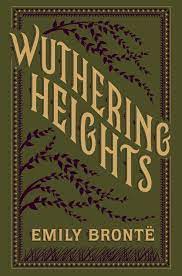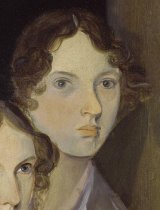Wuthering Heights Page #14
Wuthering Heights is an 1847 novel by Emily Brontë, initially published under the pseudonym Ellis Bell. It concerns two families of the landed gentry living on the West Yorkshire moors, the Earnshaws and the Lintons, and their turbulent relationships with Earnshaw's adopted son, Heathcliff.
“‘Miss Earnshaw? Nonsense!’ cried the dame; ‘Miss Earnshaw scouring the country with a gipsy! And yet, my dear, the child is in mourning—surely it is—and she may be lamed for life!’ “‘What culpable carelessness in her brother!’ exclaimed Mr. Linton, turning from me to Catherine. ‘I’ve understood from Shielders’” (that was the curate, sir) “‘that he lets her grow up in absolute heathenism. But who is this? Where did she pick up this companion? Oho! I declare he is that strange acquisition my late neighbour made, in his journey to Liverpool—a little Lascar, or an American or Spanish castaway.’ “‘A wicked boy, at all events,’ remarked the old lady, ‘and quite unfit for a decent house! Did you notice his language, Linton? I’m shocked that my children should have heard it.’ “I recommenced cursing—don’t be angry, Nelly—and so Robert was ordered to take me off. I refused to go without Cathy; he dragged me into the garden, pushed the lantern into my hand, assured me that Mr. Earnshaw should be informed of my behaviour, and, bidding me march directly, secured the door again. The curtains were still looped up at one corner, and I resumed my station as spy; because, if Catherine had wished to return, I intended shattering their great glass panes to a million of fragments, unless they let her out. She sat on the sofa quietly. Mrs. Linton took off the grey cloak of the dairy-maid which we had borrowed for our excursion, shaking her head and expostulating with her, I suppose: she was a young lady, and they made a distinction between her treatment and mine. Then the woman-servant brought a basin of warm water, and washed her feet; and Mr. Linton mixed a tumbler of negus, and Isabella emptied a plateful of cakes into her lap, and Edgar stood gaping at a distance. Afterwards, they dried and combed her beautiful hair, and gave her a pair of enormous slippers, and wheeled her to the fire; and I left her, as merry as she could be, dividing her food between the little dog and Skulker, whose nose she pinched as he ate; and kindling a spark of spirit in the vacant blue eyes of the Lintons—a dim reflection from her own enchanting face. I saw they were full of stupid admiration; she is so immeasurably superior to them—to everybody on earth, is she not, Nelly?” “There will more come of this business than you reckon on,” I answered, covering him up and extinguishing the light. “You are incurable, Heathcliff; and Mr. Hindley will have to proceed to extremities, see if he won’t.” My words came truer than I desired. The luckless adventure made Earnshaw furious. And then Mr. Linton, to mend matters, paid us a visit himself on the morrow, and read the young master such a lecture on the road he guided his family, that he was stirred to look about him, in earnest. Heathcliff received no flogging, but he was told that the first word he spoke to Miss Catherine should ensure a dismissal; and Mrs. Earnshaw undertook to keep her sister-in-law in due restraint when she returned home; employing art, not force: with force she would have found it impossible. CHAPTER VII Cathy stayed at Thrushcross Grange five weeks: till Christmas. By that time her ankle was thoroughly cured, and her manners much improved. The mistress visited her often in the interval, and commenced her plan of reform by trying to raise her self-respect with fine clothes and flattery, which she took readily; so that, instead of a wild, hatless little savage jumping into the house, and rushing to squeeze us all breathless, there “lighted from a handsome black pony a very dignified person, with brown ringlets falling from the cover of a feathered beaver, and a long cloth habit, which she was obliged to hold up with both hands that she might sail in. Hindley lifted her from her horse, exclaiming delightedly, “Why, Cathy, you are quite a beauty! I should scarcely have known you: you look like a lady now. Isabella Linton is not to be compared with her, is she, Frances?” “Isabella has not her natural advantages,” replied his wife: “but she must mind and not grow wild again here. Ellen, help Miss Catherine off with her things—Stay, dear, you will disarrange your curls—let me untie your hat.” I removed the habit, and there shone forth beneath a grand plaid silk frock, white trousers, and burnished shoes; and, while her eyes sparkled joyfully when the dogs came bounding up to welcome her, she dared hardly touch them lest they should fawn upon her splendid garments. She kissed me gently: I was all flour making the Christmas cake, and it would not have done to give me a hug; and then she looked round for Heathcliff. Mr. and Mrs. Earnshaw watched anxiously their meeting; thinking it would enable them to judge, in some measure, what grounds they had for hoping to succeed in separating the two friends. Heathcliff was hard to discover, at first. If he were careless, and uncared for, before Catherine’s absence, he had been ten times more so since. Nobody but I even did him the kindness to call him a dirty boy, and bid him wash himself, once a week; and children of his age seldom have a natural pleasure in soap and water. Therefore, not to mention his clothes, which had seen three months’ service in mire and dust, and his thick uncombed hair, the surface of his face and hands was dismally beclouded. He might well skulk behind the settle, on beholding such a bright, graceful damsel enter the house, instead of a rough-headed counterpart of himself, as he expected. “Is Heathcliff not here?” she demanded, pulling off her gloves, and displaying fingers wonderfully whitened with doing nothing and staying indoors. “Heathcliff, you may come forward,” cried Mr. Hindley, enjoying his discomfiture, and gratified to see what a forbidding young blackguard he would be compelled to present himself. “You may come and wish Miss Catherine welcome, like the other servants.” Cathy, catching a glimpse of her friend in his concealment, flew to embrace him; she bestowed seven or eight kisses on his cheek within the second, and then stopped, and drawing back, burst into a laugh, exclaiming, “Why, how very black and cross you look! and how—how funny and grim! But that’s because I’m used to Edgar and Isabella Linton. Well, Heathcliff, have you forgotten me?” She had some reason to put the question, for shame and pride threw double gloom over his countenance, and kept him immovable. “Shake hands, Heathcliff,” said Mr. Earnshaw, condescendingly; “once in a way that is permitted.” “I shall not,” replied the boy, finding his tongue at last; “I shall not stand to be laughed at. I shall not bear it!” And he would have broken from the circle, but Miss Cathy seized him again. “I did not mean to laugh at you,” she said; “I could not hinder myself: Heathcliff, shake hands at least! What are you sulky for? It was only that you looked odd. If you wash your face and brush your hair, it will be all right: but you are so dirty!”
Translation
Translate and read this book in other languages:
Select another language:
- - Select -
- 简体中文 (Chinese - Simplified)
- 繁體中文 (Chinese - Traditional)
- Español (Spanish)
- Esperanto (Esperanto)
- 日本語 (Japanese)
- Português (Portuguese)
- Deutsch (German)
- العربية (Arabic)
- Français (French)
- Русский (Russian)
- ಕನ್ನಡ (Kannada)
- 한국어 (Korean)
- עברית (Hebrew)
- Gaeilge (Irish)
- Українська (Ukrainian)
- اردو (Urdu)
- Magyar (Hungarian)
- मानक हिन्दी (Hindi)
- Indonesia (Indonesian)
- Italiano (Italian)
- தமிழ் (Tamil)
- Türkçe (Turkish)
- తెలుగు (Telugu)
- ภาษาไทย (Thai)
- Tiếng Việt (Vietnamese)
- Čeština (Czech)
- Polski (Polish)
- Bahasa Indonesia (Indonesian)
- Românește (Romanian)
- Nederlands (Dutch)
- Ελληνικά (Greek)
- Latinum (Latin)
- Svenska (Swedish)
- Dansk (Danish)
- Suomi (Finnish)
- فارسی (Persian)
- ייִדיש (Yiddish)
- հայերեն (Armenian)
- Norsk (Norwegian)
- English (English)
Citation
Use the citation below to add this book to your bibliography:
Style:MLAChicagoAPA
"Wuthering Heights Books." Literature.com. STANDS4 LLC, 2025. Web. 16 Jan. 2025. <https://www.literature.com/book/wuthering_heights_1627>.




Discuss this Wuthering Heights book with the community:
Report Comment
We're doing our best to make sure our content is useful, accurate and safe.
If by any chance you spot an inappropriate comment while navigating through our website please use this form to let us know, and we'll take care of it shortly.
Attachment
You need to be logged in to favorite.
Log In